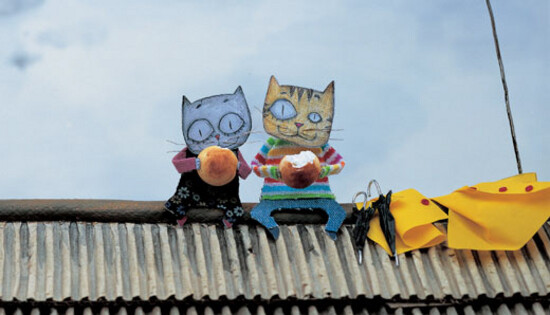hankyoreh
Links to other country sites 다른 나라 사이트 링크
Smash children’s book raked in $433 million, author paid only $18,200

By Kwak Jung-soo, business correspondent
The children‘s picture book “Cloud Bread” has been a big success, selling some 500,000 copies in South Korea. The publishers have racked up some 440 billion won (US$433 million) in sales from secondary content markets, including TV cartoons, musical versions, and items based on the characters. “Cloud Bread” tells the story of cats who are able to fly after eating bread made of cloud.
But thanks to a contract she signed selling off all rights back when she was an unknown, author Baek Hee-na collected a grand total of just 18.5 million won (US$18,200) in royalties.
The standard sales contract Baek signed allowed the company to pay a set amount to the author, after which it claimed exclusive rights to all earnings from the product’s use.
Baek’s case contrasts sharply with that of J.K. Rowling, the British author of the “Harry Potter” series. Rowling’s Harry Potter series between 1997 made around US$300 billion in sales in the film, video game, music, and music markets. Thanks to royalties, film rights, and a cut of product sales, Rowling became one of the richest people on the planet, with over US$1 billion in assets.
Now major changes look to be in store for the age-old South Korean practice of publishers claiming all profits from successful secondary content marketing, while the original author collects only a small paycheck.
The Fair Trade Commission (FTC) announced on Aug. 28 that it had ordered corrective action from 20 of the country’s leading publishers on unfair terms in the sale contract’s copyright transfer and publishing rights definition provisions.
The list of publishers includes Woongjin Think Big, Kyowon, Samsung Publishing, Sigongsa, and Gimmyoung. The actual number of publishing companies nationwide is over 4,000, but the FTC also said similar unfair contracts by any other companies not directly mentioned in the order would not be considered valid.
The provisions targeted by the FTC for corrective action include those related to the full transfer of copyrights, those ceding all secondary usage rights to the publishing, those requiring the publishing right holders’ consent when copyrights are transferred, and those setting excessively long contract periods through automatic renewal.
To date, FTC terms have allowed for the full and permanent sale of all rights to secondary products - including cartoons, musicals, theatrical works, and exhibitions - to the publishing company. The amended terms allow the creator’s choice of which rights to transfer and the drafting of other, more specific agreements.
The terms for secondary usage were also amended to state that rights were “held by the creator, who can then choose individually whether to invest them in a publishing company.”

Please direct questions or comments to [english@hani.co.kr]

Editorial・opinion
![[Editorial] Penalties for airing allegations against Korea’s first lady endanger free press [Editorial] Penalties for airing allegations against Korea’s first lady endanger free press](https://flexible.img.hani.co.kr/flexible/normal/500/300/imgdb/original/2024/0502/1817146398095106.jpg) [Editorial] Penalties for airing allegations against Korea’s first lady endanger free press
[Editorial] Penalties for airing allegations against Korea’s first lady endanger free press![[Editorial] Yoon must halt procurement of SM-3 interceptor missiles [Editorial] Yoon must halt procurement of SM-3 interceptor missiles](https://flexible.img.hani.co.kr/flexible/normal/500/300/imgdb/child/2024/0501/17145495551605_1717145495195344.jpg) [Editorial] Yoon must halt procurement of SM-3 interceptor missiles
[Editorial] Yoon must halt procurement of SM-3 interceptor missiles- [Guest essay] Maybe Korea’s rapid population decline is an opportunity, not a crisis
- [Column] Can Yoon steer diplomacy with Russia, China back on track?
- [Column] Season 2 of special prosecutor probe may be coming to Korea soon
- [Column] Park Geun-hye déjà vu in Yoon Suk-yeol
- [Editorial] New weight of N. Korea’s nuclear threats makes dialogue all the more urgent
- [Guest essay] The real reason Korea’s new right wants to dub Rhee a founding father
- [Column] ‘Choson’: Is it time we start referring to N. Korea in its own terms?
- [Editorial] Japan’s rewriting of history with Korea has gone too far
Most viewed articles
- 160% of young Koreans see no need to have kids after marriage
- 2[Editorial] Penalties for airing allegations against Korea’s first lady endanger free press
- 3Presidential office warns of veto in response to opposition passing special counsel probe act
- 4Hybe-Ador dispute shines light on pervasive issues behind K-pop’s tidy facade
- 5Months and months of overdue wages are pushing migrant workers in Korea into debt
- 6Japan says it’s not pressuring Naver to sell Line, but Korean insiders say otherwise
- 7S. Korea “monitoring developments” after report of secret Chinese police station in Seoul
- 8OECD upgrades Korea’s growth forecast from 2.2% to 2.6%
- 9[Reporter’s notebook] In Min’s world, she’s the artist — and NewJeans is her art
- 10[Guest essay] Maybe Korea’s rapid population decline is an opportunity, not a crisis